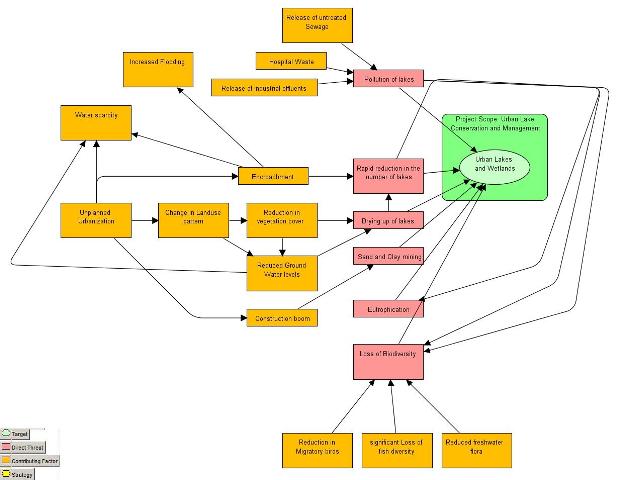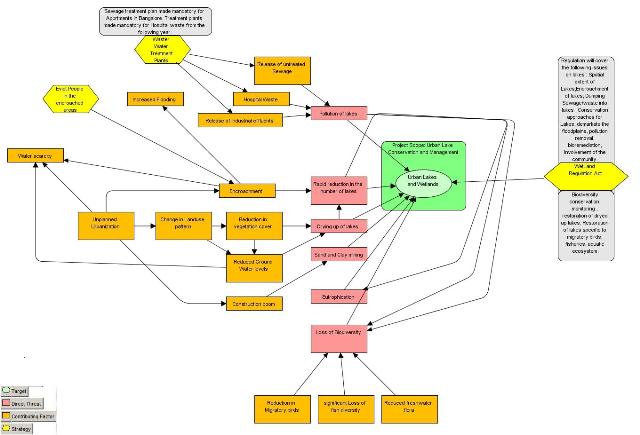Conservation and Management of Urban Lakes
Brainstorming Session on Conservation & Management of Urban Lakes 26th Sept 09
The speakers of the conference gave an insight into the current situation of the urban lakes, especially focusing on the perils of the Bangalore lakes. Based on the issues raised by the panel of speakers, the threats listed out by them and the contributing factors that have led to the depleted state of Bangalore’s lakes, I have constructed a color coded flow map. The following diagram gives a composite picture of the issues discussed and the strategies proposed in the conference.

Figure 1: State of the lakes and Wetlands in India. The legend for the diagram is to the bottom left corner of the flowchart.

Figure 2: Current scenario and the proposed strategies in the Hexagonal boxes. (Description of strategies in the textbox attached to the strategy boxes). The legend for the diagram is stuck in the bottom left corner of the flowchart.
A high resolution of these flow charts is attached at the end of this blog.
In my opinion, we should follow:
1. T.V.Ramachandra, Professor, CiSTUP ,IISC :
He has worked on wetland ecosystem for over a decade. He has an in-depth understanding of the system. Having observed the wetland ecosystem for such a long time, his colleagues and he is aware of the problems of Lakes. He has been conducting environment awareness for the school children. One of the significant contribution from Ramachandra towards betterment of lakes is a submission of a Wetland Regulation Act to the government in 2008 and which is to be passed in the parliament this year. This might be a legal step towards protecting the Wetland Ecosystem.
2. Mohan, Professor, CiSTUP, IISc :
He has been closely working with BDA and BWSSDB in planning the sewer lines, so that they do not mix up with storm water drains.
3. LDA :
LDA has begun a study of 117 lakes in Bangalore, to understand the current situation, major problems and the causes?
Institute engaged in this process is Shriram Institute. (Can they help us with these studies and reports?)
Disappointments:
While all the representatives spoke about the reasons for mismanagement of lakes, none had any defined approach towards addressing it. Absence of clearly defined governing structure for water resources (Lakes) has resulted in numerous parallel institutions with conflicting identities.
I find that the decision makers have repeatedly failed to improve the state of lakes because of three main reasons:
1. Poor communication amongst various departments like the BDA, BWSSDB, LDA, Forest department.
2. Unwillingness to cooperate, keeping aside their differences for the purpose.
3. Lack of statutory powers with bodies like Lake Development Authority and Department of Fisheries to take action against any illegal activity in and around the lakes.
/articles/brainstorming-session-conservation-and-management-urban-lakes-bangalore